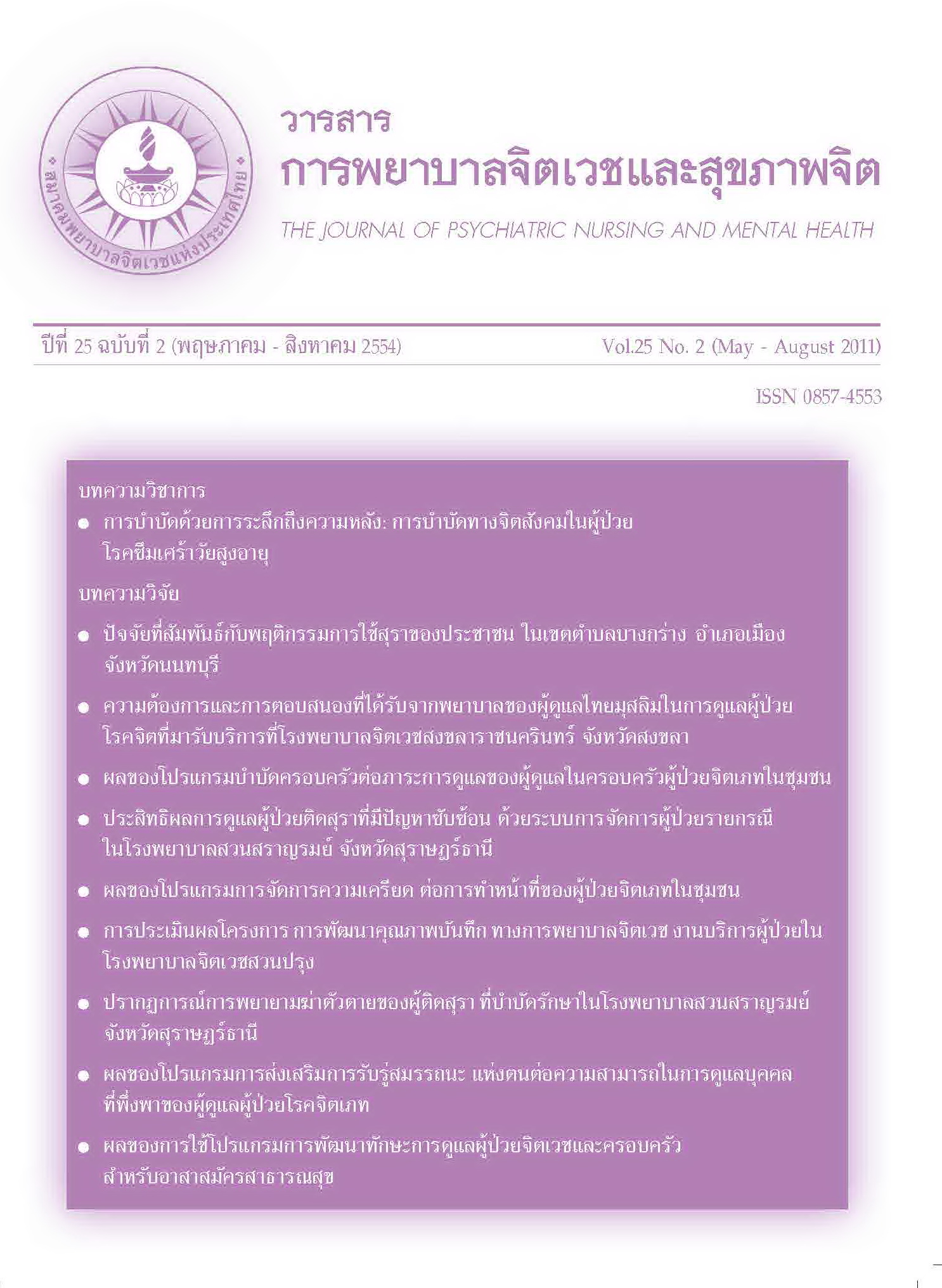ประสิทธิผลการดูแลผู้ป่วยติดสุราที่มีปัญหาซับซ้อนด้วยระบบการจัดการผู้ป่วยรายกรณี ในโรงพยาบาลสวนสราญรมย์ จังหวัดสุราษฎร์ธานี
Main Article Content
บทคัดย่อ
บทคัดย่อ
การศึกษาครั้งนี้มีวัตถุประสงค์เพื่อ เปรียบเทียบระยะวันนอนในโรงพยาบาล ค่าใช้จ่ายในการรักษาพยาบาล ความพึงพอใจต่อบริการที่ได้รับของผู้ป่วยและญาติ คุณภาพชีวิตของผู้ป่วย และอัตราการป่วยซ้ำ ระหว่างกลุ่มที่ได้รับการดูแลแบบการจัดการผู้ป่วยรายกรณี และกลุ่มที่ได้รับการดูแลตามปกติ กลุ่มตัวอย่างประกอบด้วย ผู้ป่วยติดสุราที่มีปัญหาซับซ้อน จำนวน 30 คน และญาติผู้ป่วยติดสุราที่มีปัญหาซับซ้อน จำนวน 30 คน โดยการคัดเลือกกลุ่มตัวอย่างแบบเฉพาะเจาะจงตามคุณสมบัติที่กำหนด จัดเข้ากลุ่มควบคุมซึ่งได้รับการดูแลตามปกติ และกลุ่มทดลองได้รับการดูแลแบบการจัดการผู้ป่วยรายกรณี กลุ่มละ 15 คน เครื่องมือที่ใช้ในการวิจัยประกอบด้วย (1) แผนการดูแลทางคลินิกผู้ป่วยติดสุราที่มีปัญหาซับซ้อนในโรงพยาบาล (2) แบบบันทึกค่าใช้จ่ายในการรักษาพยาบาล และระยะวันนอน ในโรงพยาบาล (3) แบบวัดความพึงพอใจต่อบริการของผู้ป่วยและญาติ ซึ่งมีค่าความเที่ยงเท่ากับ .83 และ .86 ตามลำดับ และ (4) แบบวัดคุณภาพชีวิตของผู้ป่วยมีค่าความเที่ยงเท่ากับ .82 วิเคราะห์ข้อมูลด้วยสถิติเชิงบรรยาย และทดสอบด้วยค่าทีอิสระ
ผลการวิจัย พบว่า ค่าเฉลี่ยค่าใช้จ่ายในการรักษาพยาบาล และค่าเฉลี่ยระยะวันนอนในโรงพยาบาลของผู้ป่วยกลุ่มทดลองน้อยกว่ากลุ่มควบคุมอย่างมีนัยสำคัญทางสถิติที่ระดับ .01 ค่าเฉลี่ย ระดับความพึงพอใจต่อบริการที่ได้รับของผู้ป่วย และญาติกลุ่มทดลองสูงกว่ากลุ่มควบคุมอย่างมีนัยสำคัญทางสถิติที่ระดับ .01 ค่าเฉลี่ยคุณภาพชีวิตกลุ่มทดลองและกลุ่มควบคุมไม่มีความแตกต่างอย่างมีนัยสำคัญทางสถิติ อัตราป่วยซ้ำของกลุ่มทดลองและกลุ่มควบคุมหลังจำหน่าย ภายใน 3 เดือน ร้อยละ 6.7 เท่ากัน แต่ภายใน 6 เดือน กลุ่มทดลองน้อยกว่ากลุ่มควบคุม 3 เท่า
ผลการวิจัยสนับสนุนว่า การดูแลผู้ป่วยแบบการจัดการผู้ป่วยรายกรณีสามารถเพิ่มประสิทธิผลการดูแลผู้ป่วยติดสุราที่มีปัญหาซับซ้อนได้ ดังนั้นควรมีการนำรูปแบบการดูแล ผู้ป่วยแบบการจัดการผู้ป่วยรายกรณีไปประยุกต์ใช้ในโรงพยาบาลจิตเวชระดับตติยภูมิอื่นๆ ต่อไป เพื่อให้การดูแลผู้ป่วยมีคุณภาพยิ่งขึ้น
คำสำคัญ : การจัดการผู้ป่วยรายกรณี, ประสิทธิผลการดูแลผู้ป่วย, ผู้ป่วยติดสุราที่มีปัญหาซับซ้อน
Abstract
The objectives of this study was to compare length of stay, cost of treatment, patient’s and relative’s satisfaction, patient’s quality of life, and relapsed rate among patients receiving a case management care and those receiving regular care. Subject consisted of 30 Complex’s alcoholic patents and 30 relatives, selected from inclusion criteria. 15 out of each group were selected into control group and others were in experiment group. Instruments included (1) clinical pathway for Complex’s alcoholic patients, (2) record of length of stay and cost of treatment, (3) satisfaction of service for patient and relative which gave the value of Cronbach’s alpha coefficient as .83 and .86, respectively, and (4) patient ,s quality of life with the value of Cronbach’s alpha coefficient as .82 Data were analyzed using descriptive statistics and independent t – test.
The result showed that mean score of cost of treatment and length of stay among experiment group was significantly lower than those of control group (p< .01). Mean score of patient and relative’s satisfaction among experiment group was significantly higher than those of control (p< .01). There was no significantly different of mean score of patient quality of life. Recurrent rate after discharged 3 month was not significantly different (6.7%); however, it was found that the relapsed rate at 6 month of experiment group was lower than that of control group.
The findings showed that case management system could be used to increase effectiveness of care for complex’s alcoholic patients. There was a recommendation to use case management system in other tertiary hospitals.
Key words : Case Management, Care for Complex’s Alcoholic Patient, Effectiveness
Article Details
บทความที่ได้รับการตีพิมพ์แล้ว เป็นลิขสิทธิ์ของสมาคมพยาบาลจิตเวชแห่งประเทศไทย


